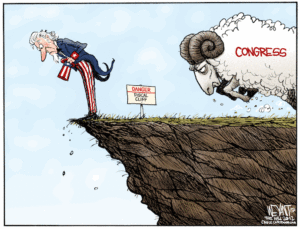
CO-04 (Special Election)
See Full Big Line
(R) Greg Lopez
(R) Trisha Calvarese
90%
10%

President (To Win Colorado)
See Full Big Line
(D) Joe Biden*
(R) Donald Trump
80%
20%↓

CO-01 (Denver)
See Full Big Line
(D) Diana DeGette*
90%

CO-02 (Boulder-ish)
See Full Big Line
(D) Joe Neguse*
90%

CO-03 (West & Southern CO)
See Full Big Line
(D) Adam Frisch
(R) Jeff Hurd
(R) Ron Hanks
40%
30%
20%

CO-04 (Northeast-ish Colorado)
See Full Big Line
(R) Lauren Boebert
(R) Deborah Flora
(R) J. Sonnenberg
30%↑
15%↑
10%↓

CO-05 (Colorado Springs)
See Full Big Line
(R) Dave Williams
(R) Jeff Crank
50%↓
50%↑

CO-06 (Aurora)
See Full Big Line
(D) Jason Crow*
90%

CO-07 (Jefferson County)
See Full Big Line
(D) Brittany Pettersen
85%↑

CO-08 (Northern Colo.)
See Full Big Line
(D) Yadira Caraveo
(R) Gabe Evans
(R) Janak Joshi
60%↑
35%↓
30%↑

State Senate Majority
See Full Big Line
DEMOCRATS
REPUBLICANS
80%
20%

State House Majority
See Full Big Line
DEMOCRATS
REPUBLICANS
95%
5%
 November 30, 2017 04:05 PM UTC
November 30, 2017 04:05 PM UTC 16 Comments
16 Comments One of the most oft-repeated talking points for Republicans about their tax plan is that it would create so much growth in the economy that it would pay for itself over time. This is a favorite soundbyte designed to make Republicans feel better about the fact that they are promoting legislation that would increase the national debt by more than a trillion dollars.
One of the most oft-repeated talking points for Republicans about their tax plan is that it would create so much growth in the economy that it would pay for itself over time. This is a favorite soundbyte designed to make Republicans feel better about the fact that they are promoting legislation that would increase the national debt by more than a trillion dollars.
But as Moldy put it so eloquently, "Republicans are desperate for a win". The fact that this means everyone else loses doesn't matter with GOP "math".
They will always have Neil Gorsuch.
Republicans’ Tax Lies Show the Rot Spreads Wide and Runs Deep
https://www.nytimes.com/2017/11/30/opinion/republican-tax-lies-fed.html
Republicans deep down sense they may only have 1 to 3 years to "Fuck America, Yeah!", thus the rush to pass crippling legislation to realize their Dystopian fantasy vision of the future that they hope can never be overturned.
I thought this too. They are like a 'Smash and Grab' bunch of robbers who want to get away with the loot before the cops arrive. Why else would they attempt to ram through major legislation without any hearings or witnesses? Fuckers.
My favorite in the rhetoric is:
"the tax plan as it is laid out will only cost $1.4 billion"
"What about the tax increases on 80% of the people after 2022 or so?"
"Well, no future Congress would really allow those taxes to rise."
"So, with that change in the tax plan, how much will it cost?"
[crickets …. ] because the answer calculated by several groups is OVER $2 Trillion.
But what does Chris Cillizza say?!?!?!?!?
Fiscal conservative? What the hell is that? Eight years of G.W. Bush and the GOP running up huge deficits to pay for bogus wars, then another eight years of Obama and the Dems spending trillions in stimulus for an anemic "recovery", and now we're at 20 trillion in debt and counting.
Finding a "fiscal conservative" in Washington is about as rare as finding a congressman who can keep their pants zipped.
God you are a piece of hateful shit. Anemic recovery my ass. The country was losing 700,000 jobs a month when he was sworn into office.
I think the stimulus spending was $800B. I'm willing to see facts which differ. Personally, I advocated with Bennet to do a second round equal to the first. It worked.
This is the time that Voo-Doo will finally work!
The righties on #COpolitics twitter feed promise! It will "UNLEASH" the American economy and RICHES will rain down in bigly trickles, filling in the deficit like a magic beanstalk of growth!
Its how "supply (side) and demand" works. Supply your donors with more wealth, ignore the demands of the masses you're screwing.
For some, if you keep doing the same exact thing over and over again, eventually you get a better result.
Damn, you, Einstein!
Perhaps Allyn can answer this: why is there a need for any fiscal stimulus that "gets the economy going and creates new jobs?" The economy is generally considered to be at or near full employment, despite there being pockets still of high unemployment. The bigger problem is not enough jobs; rather, it is finding trained persons to fill job vacancies. The stock markets are at all time highs. Corporate earnings are good.
I'll add that the corporate tax rate is too high when compared to other OECD countries. Perhaps a bill to repatriate some of the trillions of dollars held overseas would be a better direction here. Back to you, Allyn
Since a third of the stock market is held by foreigners, lowering the corporate tax rate would result in 1/3 of the tax break flowing out of the country.
Good point.
Foreign aid for the foreign rich?